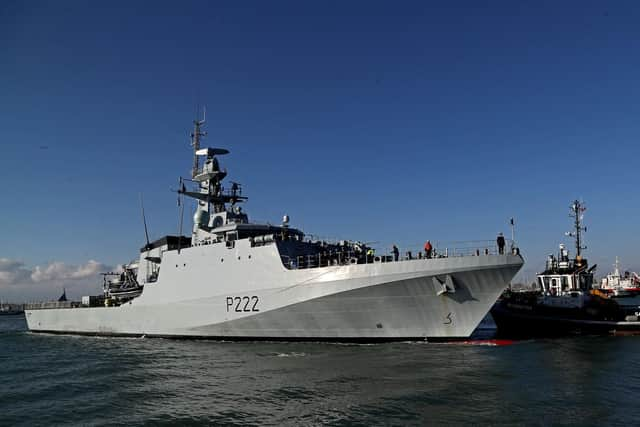Royal Navy will not step in to bodyguard British fishermen from ‘aggressive’ French trawlers after Brexit


The decision was confirmed by armed forces minister Mark Lancaster this week and comes following a series of bizarre clashes between UK and French fisherman last year – dubbed ‘The Scallop Wars’.
The confrontation took place in August and saw a fleet of about 35 French vessels ramming a group of six UK scallop dredgers.
Advertisement
Hide AdAdvertisement
Hide AdFlares, rocks and even petrol bombs were flung at the UK ships in a display which shocked the nation’s fishing industry, prompting calls for the Royal Navy to intervene and act as bodyguards.


Speaking at the time, Brian Whittington, skipper of the Golden Promise, said: ‘It was scary – I’ve never experienced anything like it. Shackles, flares, rocks were being thrown.
‘Maybe the Royal Navy could help us next time.’
However, Mr Lancaster has scuppered those hopes, claiming the navy would do no such thing.


His comments came following a question from Romford MP, Andrew Rosindell who asked whether the MoD would ‘provide protection for British fishermen who encounter aggressive action from French fishermen in British waters after the UK leaves the EU’.
Advertisement
Hide AdAdvertisement
Hide AdMr Lancaster said: ‘Royal Navy vessels operate in UK waters in addition to the United Kingdom Border Force, marine policing units, the vessels of the inshore fishery conservation authorities and maritime and coastguard agency aircraft.
‘These operations ensure that freedom of navigation is maintained so that everyone who seeks to use the seas for their lawful business, regardless of nationality, can do so.’
But he added: ‘There are no plans for Royal Navy vessels to be used to provide direct security to British fisherman after the UK leaves the EU.’
A peace deal has since been signed between UK and French fishing fleets which meant UK vessels under 15 metres will continue to be able to take scallops from the waters but larger boats will cease fishing activities in the Baie de Seine.
Advertisement
Hide AdAdvertisement
Hide AdHowever, the Royal Navy does have form for intervening in fishing disputes.
The Senior Service stepped into such a role during the so-called 'Cod Wars' between the 1950s and 1970s, a series of clashes between Britain and Iceland over fishing rights in Icelandic waters.
It all sparked on September 1 September 1958, when Iceland extended its fishing limit from four to 12 nautical miles from the coast.
British vessels ignored the official deadline for withdrawal and refused to move outside of the new fishing zone, leading to confrontations with Icelandic crews.
Advertisement
Hide AdAdvertisement
Hide AdAt one point, 37 warships were mobilised in the disputed territory – and even went as far as ramming Icelandic vessels trying to stop British trawlers.
Among the vessels first deployed included those four, HMS Eastbourne, HMS Russell, HMS Palliser and HMS Hound, from the Royal Navy’s fishery protection squadron.
The navy’s current fishery protection squadron has been bolstered by a Brexit readiness fund, which provided extra cash to keep patrol ships that were due to be decommissioned in service.